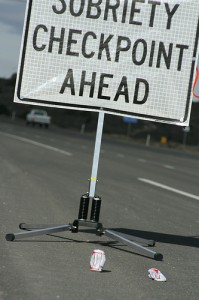In Escondido Road Stops Also Function as Immigration Checkpoints
 California as a whole has not passed a copy cat SB-1070 law but there certainly are municipal efforts to make immigrant lives harder. Such is the case with Escondido, a San Diego County town, that has struck a deal with ICE to double DUI checkpoints as immigration checkpoints.
California as a whole has not passed a copy cat SB-1070 law but there certainly are municipal efforts to make immigrant lives harder. Such is the case with Escondido, a San Diego County town, that has struck a deal with ICE to double DUI checkpoints as immigration checkpoints.
(Flickr: Zane Paul Photos)
via Huffington Post
###
For every drunk driver, Escondido police pick up about 10 unlicensed drivers — a majority of which are undocumented immigrants. DUI road barriers effectively serve as immigration checkpoints in this California town.
According to a new report from KPBS news in San Diego, this policy is one of many recent initiatives by the Escondido police that directly target undocumented immigrants and the Latino population — 49 percent of Escondido’s 145,000 residents.
Other policies include proposed restrictions on food carts and parking in Latino neighborhoods and a 2006 ban on rental properties for anyone without proof of legal residency. However, the later restraint was ruled unconstitutional and ultimately discontinued.
Escondido police paired with U.S. Immigration and Customs Enforcement (ICE) in 2010 to initiate “Operation Joint Effort,” which instituted dual DUI-immigration checkpoints.
The city is the first in the country to strike up such an agreement with ICE, so that the agency is informed whenever an undocumented immigrant is suspected. ICE also maintains an office at the local police station.
Critics of the program maintain that it is unfairly targeting Latinos, specifically undocumented immigrants who are not eligible to apply for a driver’s license. Though a new law took effect in January to provide unlicensed drivers the chance to recover their car immediately with the help of a licensed driver, the undocumented population is still at risk of deportation.
One 34-year-old mother of four was stopped at a DUI checkpoint at 9:30 a.m. after dropping off two of her children at school, KPBS reports. Soon after she was taken to an immigration holding facility, since she did not have a license and was suspected of being an undocumented immigrant. She was then processed and deported to Mexico, leaving her four children behind.
Operation Joint Effort has removed more than 650 illegal immigrants since its inception in May 2010. Since the program involves a partnership with ICE, rather than training Escondido police to enforce federal immigration laws, it is not considered part of the controversial 287(g) program that the Obama administration is seeking to discontinue.
However, the program has other issues of legality that raise concerns.
The DUI checkpoints are funded by grants from the state’s Office of Traffic Safety, which requires certain conditions be fulfilled, such as the rule that no profits can be generated from checkpoints. KPBS finds that Escondido and tow companies have raked in $11 million from these checkpoints in fees, citations and auctioned vehicles.
What’s more, Escondido police have violated state law by making a profit from towing cars, rather than justifying and billing for tow fees after the fact. The city allows companies to tow vehicles at the steep price of $75,000 per year, enabling Escondido to collect a total of $450,000 from six tow companies. To make up for the discrepancy between this total cost and what’s actually billed, additional items such as bulletproof vests and police radios were included in towing expenses in a 2011 city report.












Showing 1 reaction
Sign in with